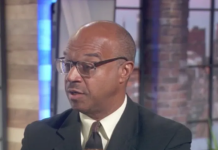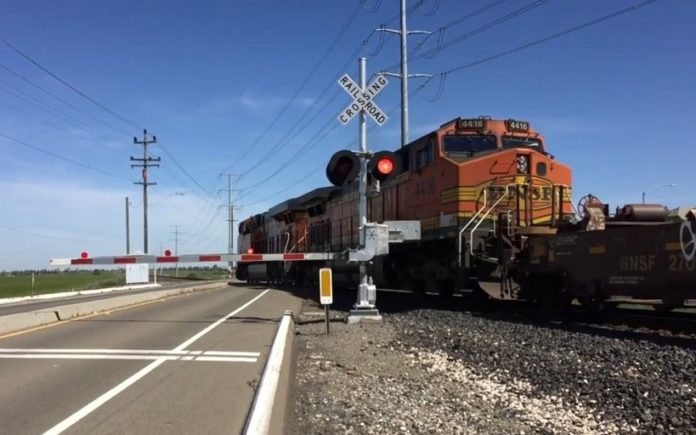Kansas came out on the losing side of an effort to get the U.S. Supreme Court to take up a case out of Ohio that could have had implications for preventing blocked railroad crossings in Kansas.
The U.S. Supreme Court on Monday turned back a request from the state of Ohio to review a state law that prohibits stopped trains from blocking public roads for five minutes. Kansas was among 18 states that asked for the court to consider the appeal.
The Ohio Supreme Court found that federal law preempted the state’s blocked crossing statute, which was used to cite CSX in 2018 with five misdemeanor counts of violating the state’s blocked-crossing statute.
A municipal court dismissed all five counts on the grounds that the state statute was preempted by federal law.
The case ultimately went to the Ohio Supreme Court, which agreed that the charges against CSX should be dismissed in a 5-2 vote.
With support from Kansas and 17 other states, Ohio Attorney General Dave Yost appealed the case to the U.S. Supreme Court.
“Despite federal inaction, a flawed consensus among lower courts is preventing state and local governments from exercising their police powers to protect their citizens,” Yost argued in a brief filed with the U.S. Supreme Court.
“There has been plenty of time — over two decades — for these preemption questions to
percolate in the lower courts. Circuits and state high courts are consistently getting the answers wrong,” Yost argued.
Before leaving office last year, former Kansas Attorney General Derek Schmidt joined a friend-of-the-court brief asking the Supreme Court to take up the case.
The states said nothing less than public safety was at risk, noting that blocked train crossings endanger lives by interfering with the work of emergency responders.
“Absent enforceable anti-blocking statutes and ordinances, railroads have little incentive to remove idle trains from grade crossings expeditiously,” Schmidt and the attorneys general wrote in their brief.
“Anti-blocking laws like Ohio’s facilitate swift access by municipal fire and rescue services to scenes of local emergencies that often implicate life and death,” the attorneys general wrote in defending the Ohio law.
“In recent years, too many emergency vehicles have arrived too late to save lives; too many EMTs have risked life and limb climbing over trains to reach those in need; too many fires have burned while emergency crews detoured miles out of the way; and too many communities have been bisected for days waiting for train crews to unblock intersections.”
Kansas is among 38 states that have railroad crossing laws on the books.
However, in 2018, the Kansas Court of Appeals reversed a ruling from Chase County District Court that imposed a fine on BNSF Railway for blocking a road for more than four hours.
The Kansas appeals court found that the 1923 law, which barred trains from blocking intersections for more than 10 minutes without leaving a 30-foot opening, was superseded by federal law.
In that case, the Kansas appeals court relied on previous cases that cited the preemption powers of the Surface Transportation Board for blocking enforcement of the Kansas law.
Schmidt said at the time there had been efforts in the Kansas Legislature that would have further regulated railroad crossings, including allowable distances for parking rail cars from crossings to not impede sight lines for automobile traffic.
But those measures have stalled over federal preemption concerns.
The U.S. Justice Department urged the court not to hear the Ohio case.
“Every federal court of appeals and state court of last resort to have addressed the issue has concluded that blocked-crossing laws…are preempted by federal law,” U.S. Solicitor General Elizabeth Prelogar argued in her brief.
She noted that the U.S. Supreme Court recently refused to hear a similar case out of Oklahoma involving rail crossings that presented the same questions.
“The court should follow the same course here,” she wrote.
CSX argued in its brief that blocked rail crossings do not pose a safety threat.
The company said that Ohio and other states that have filed briefs in the case have only identified 20 incidents involving blocked train crossings.
CSX said five of those incidents resulted in a death and two in property damage.
“While not diminishing the impacts of the events on the individuals and families involved, those numbers are vanishingly small when compared to the number of trains traversing grade crossings daily,” the company said.
















